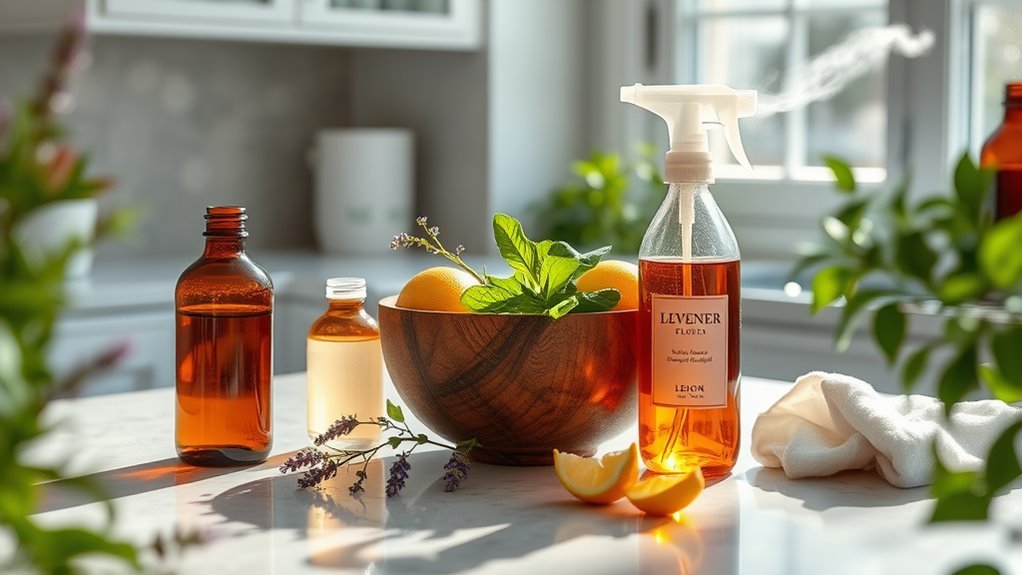How to Clean With Essential Oils for a Fresh Scent
You can easily freshen your home by adding 15-20 drops of your favorite essential oils, like lemon or lavender, to a mix of equal parts distilled water and white vinegar in a spray bottle. This creates a natural, antibacterial cleaner that breaks free from harsh chemicals and leaves a delightful scent. You can also boost laundry freshness or use oils in diffusers for odor control. Keep scrolling to discover how to tailor this for every room and purpose.
Benefits of Using Essential Oils in Cleaning

While you might already know essential oils for their pleasant scents, they offer much more when it comes to cleaning. Using essential oils lets you break free from harsh chemicals and embrace eco friendly alternatives that protect both your home and the planet. These natural extracts have antibacterial and antifungal properties, making your cleaning routine effective without compromising safety. Of course, you’ll want to follow safety precautions, like diluting oils properly and avoiding direct contact with skin or eyes, to guarantee a safe environment. By choosing essential oils, you gain a powerful, natural way to refresh your space while staying true to your values of health and sustainability. This approach gives you the freedom to clean confidently and consciously every day.
Choosing the Right Essential Oils for Your Home
Now that you understand the benefits of using essential oils in cleaning, it’s important to pick the right ones for your home. Your choice sets the mood and boosts your cleaning power. If you want to feel energized and refreshed, citrus scents like lemon or orange are perfect. For a calming, natural vibe, herbal aromas such as eucalyptus or rosemary work wonders.
Consider these tips when choosing:
- Match scents to the room’s purpose—energize kitchens with citrus, relax bedrooms with herbal.
- Check for any allergies or sensitivities in your household.
- Opt for pure, high-quality oils to maximize benefits and safety.
How to Make an All-Purpose Essential Oil Cleaner

To make your own all-purpose essential oil cleaner, you’ll need a few simple ingredients like water, white vinegar, and your chosen essential oils. Mixing is easy: combine these in a spray bottle and shake well to blend. This DIY cleaner is perfect for tackling a variety of surfaces around your home.
Ingredients Needed
Creating an all-purpose essential oil cleaner starts with gathering a few simple ingredients that you probably already have at home. To make your cleaning routine both effective and enjoyable, focus on choosing the right essential oil types that offer natural antibacterial and freshening properties. Alongside your essential oils, you’ll want to round up basic cleaning supplies that are versatile and safe for most surfaces.
Here’s what you need:
- Distilled water to dilute and carry the oils
- White vinegar for its natural disinfectant power
- Your favorite essential oils like lemon, tea tree, or eucalyptus for scent and cleaning boost
With these ingredients, you’re set to craft a cleaner that’s fresh, free of harsh chemicals, and perfectly tailored to your lifestyle.
Mixing Instructions
Once you’ve gathered your ingredients, mixing your all-purpose cleaner is straightforward and quick. Start by combining 1 cup of water with 1 cup of white vinegar in a spray bottle—this balanced mixing ratio guarantees effective cleaning. Next, add about 15-20 drops of your favorite essential oils, like lemon or tea tree, for a fresh scent and added antimicrobial power. When blending, shake the bottle gently to mix everything well without creating excessive foam. Remember, proper blending techniques help the oils disperse evenly throughout the solution. You can tweak the mixing ratios to suit your needs, but keep the essential oils within safe limits to avoid overpowering scents. This simple process frees you from harsh chemicals while keeping your space fresh and clean.
Using Essential Oils in Laundry and Fabric Care
You can boost your laundry routine by adding essential oils for fresh scents and natural antibacterial benefits. Just a few drops in your detergent or dryer can help keep fabrics smelling great and feeling soft. Let’s explore some tips to get the most out of essential oils in your fabric care.
Essential Oils Laundry Benefits
Although laundry might seem like a routine task, adding essential oils can transform your fabric care routine by naturally boosting freshness and softness. Thanks to essential oils properties like antibacterial and deodorizing effects, your clothes not only smell amazing but stay cleaner longer. You’ll enjoy a laundry experience that feels less like a chore and more like self-care.
Try these benefits when you add essential oils to your laundry:
- Enhanced laundry freshness that lingers without synthetic chemicals
- Natural fabric softening, reducing the need for harsh additives
- A personalized scent experience, giving you freedom to craft your own fresh vibe
Embracing essential oils lets you take control of your laundry, making every load a breath of clean, natural air.
Fabric Care Oil Tips
Three simple fabric care oil tips can make your laundry routine more effective and enjoyable. First, add a few drops of your favorite essential oil to unscented fabric softeners to naturally soften clothes while releasing a fresh scent. Second, create your own scent boosters by mixing essential oils with baking soda; sprinkle this mixture on laundry before washing to eliminate odors and infuse long-lasting fragrance. Finally, use essential oils on dryer balls instead of commercial softeners to reduce static and add a gentle aroma without chemicals. By incorporating these easy tweaks, you reclaim control over your laundry’s scent and softness, embracing a natural, liberating way to care for your fabrics while avoiding synthetic additives. You’ll love how fresh and free your clothes feel after each wash.
Essential Oils for Air Freshening and Odor Control

A simple way to freshen your home’s air and eliminate odors is by using essential oils. They offer a natural, liberating alternative to chemical sprays, filling your space with vibrant scents that uplift your spirit. To enjoy the benefits, try these oils for air freshening and odor control:
- Lemon or grapefruit for a burst of citrus freshness that energizes any room
- Lavender or eucalyptus to introduce calming herbal aromas and fight unwanted smells
- Tea tree oil, known for its antibacterial properties, keeps the air clean and pure
You can diffuse these oils or create a spray by mixing them with water. Embrace the freedom of a fresh, inviting home environment without harsh chemicals, letting these essential oils transform your space naturally and beautifully.
Tips for Safe and Effective Use of Essential Oils in Cleaning
When using essential oils for cleaning, you’ll want to handle them carefully to get the best results without any risks. First, always follow safety precautions: dilute oils properly, avoid direct skin contact, and keep them away from children and pets. Testing a small cleaning area helps prevent damage. Proper oil storage is key—keep bottles tightly sealed in a cool, dark place to maintain their potency and prevent degradation. Use glass containers instead of plastic to avoid reactions. Label your blends clearly, so you know what’s inside and avoid accidental misuse. By respecting these tips, you can enjoy the freedom to clean naturally and effectively, creating a fresh, safe environment without compromising your well-being.
Frequently Asked Questions
Can Essential Oils Damage Certain Surfaces or Materials?
You should definitely consider surface compatibility when using essential oils because some oils can harm sensitive materials. Not all surfaces can handle concentrated oils; for example, unsealed wood or certain plastics might get damaged. Since you want freedom to clean without worry, always test a small area first or dilute oils properly. Being mindful of material sensitivity helps you enjoy the benefits without causing unintended harm to your belongings.
How Long Do Essential Oils Keep Their Scent in Cleaning Solutions?
Imagine walking into a room where the air bursts with a fresh, lingering aroma—that’s the power of essential oils’ scent longevity. Typically, their fragrance stays vibrant for a few hours up to a day in cleaning solutions, depending on the oil and mixture. While you enjoy that freedom of a naturally fresh space, remember the cleaning effectiveness might fade sooner, so it’s best to mix fresh batches to keep both scent and cleanliness at their peak.
Are Essential Oils Safe to Use Around Pets?
When using essential oils around pets, you’ve got to prioritize pet safety because many oils can cause essential oil toxicity. Some oils like tea tree, eucalyptus, and citrus are especially risky for cats and dogs. If you want to enjoy those fresh scents without worry, always dilute oils properly and keep them out of your pet’s reach. When in doubt, consult your vet to keep your furry friends safe and happy.
Can Essential Oils Replace Commercial Disinfectants Completely?
You might be tempted to ditch commercial disinfectants for essential oils, but their effectiveness comparison shows they aren’t quite up to the task alone. While essential oils offer a natural scent and some antimicrobial properties, they don’t meet strict safety regulations required for disinfecting. If you want freedom in your cleaning routine, you can use oils to freshen the air, but don’t rely on them fully to replace commercial disinfectants.
What Is the Best Way to Store Homemade Essential Oil Cleaners?
You’ll want to store your homemade essential oil cleaners in glass containers to keep their potency intact and avoid chemical reactions. Dark storage is key—think cupboards or drawers away from sunlight—to preserve the oils’ freshness and effectiveness. This way, you maintain your freedom to create eco-friendly, powerful cleaners without worrying about them losing strength. Keep them cool and sealed tight, and you’re good to go!






